Homeland Activities: Kids bring their energy to story time
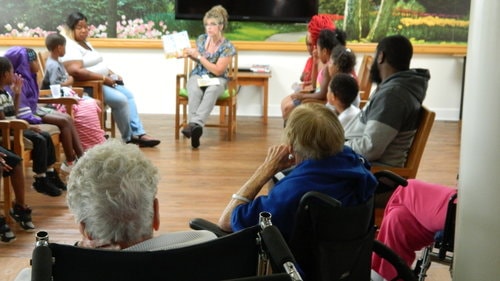
Homeland Center Activities Coordinator Dee Smith strides into the Homeland Solarium and the children lining the benches sit up and smile.
“How is everyone?” Smith says brightly. “Good? Good! Nice day out today! Which stories are we going to read today?”
It’s Story Time at Homeland. Twice a month in the summer the children from McLamb Memorial Church Day Care Center walk just around the corner from their child care to Homeland. The first- through third-graders hear Smith read a story, while residents watch and smile.
Today, Smith reads “Pizza and Other Stinky Poems.”
“Onions are round, and yellow and smelly,” she begins. “No one would eat them with strawberry jelly.” From there, the poems continue, and the kids giggle over the idea of Irish stew that tastes like glue.
“The book rhymes!” one boy says. Another child alertly corrects Smith when she mistakenly reads the word “sitter” as “sister.”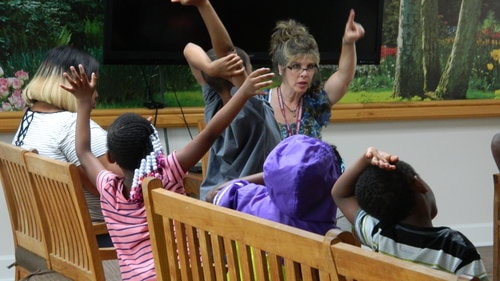
After poems about the joys of growing watermelon and the futility of getting peanut butter off the roof of your mouth, Smith comes to one about ice cream.
“Ice cream!” she says. “Remember this? ‘I scream. You scream.’” The kids join in and so do the Homeland residents. “’We all scream for ice cream!’”
After the reading, Smith shares a treat – Dunkin’ Donuts for everyone. When Smith asks if anyone knows a word that rhymes with donut, no one can think of anything, but one student suggests, “Ronut?” All agree it was a nice try.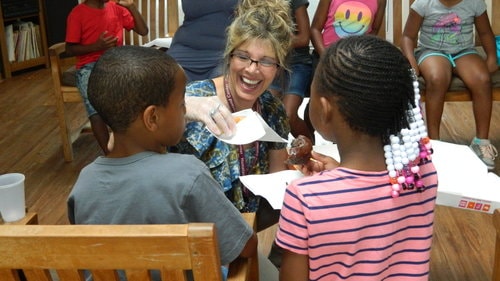
Homeland resident Shirley Miller thoroughly enjoys the encounter.
“It’s wonderful,” she says. “Just the fact that we get to see little children is nice. These children are so well-behaved.”
One girl named Jan’Yae was actively engaged in the activity, answering all of Smith’s questions and riveted by the poetry readings. “They were stinky,” she says.
The day care’s head teacher, Chinia Plant, said the kids love coming to Homeland. They enjoy hearing Smith read to them, looking at the birds in the solarium aviary, and singing at the end of the program. If they miss a day, one boy named Jermaine always asks, “When are we going to Homeland? We missed our trip to Homeland.”
“I look forward to it, too,” says Plant. “The staff are very nice to us.
They treat our kids with nothing but love.”
Jermaine said he likes to come to Homeland for the donuts and to see the residents.
“They’re happy,” he said.
Seeing all the children “brings back a lot of memories of when you were a child yourself,” says Homeland resident Ray Caldwell. “We didn’t have anything like this in school. We had recess. That was just a time to get together and play a game or two, and then you went right back in. This is a nice outing for the kids.”
Caldwell remembers that his parents had two books depicting the First World War. “I used to love to sit on the couch with my dog Spot, and I would look at those pictures,” he says.
As the children were leaving, Smith asked for hugs, and they happily complied. Smith joined Homeland in early 2017 and is “loving it.”
“I love what it stands for,” she says. “You can see the staff cares. I come here to do a job and make other people feel good, and they have no idea how good they make me feel.”
As for the visits from the kids, Smith loves their energy.
“I love the way they interact with the older generation,” she says. “It brings out the residents’ inner child. It spruces them up. You can just see the energy when the kids are around.”

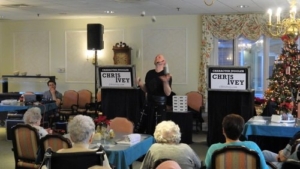
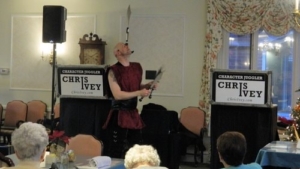


 For a small group of Homeland Center residents, their twice-weekly knitting circle isn’t just a chance to chat as they create intricate patterns. These four ladies knit with a purpose – creating slippers for homeless women and children.
For a small group of Homeland Center residents, their twice-weekly knitting circle isn’t just a chance to chat as they create intricate patterns. These four ladies knit with a purpose – creating slippers for homeless women and children.
